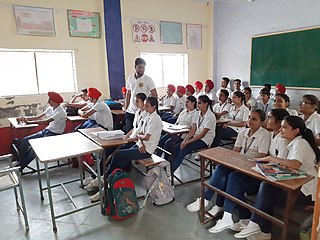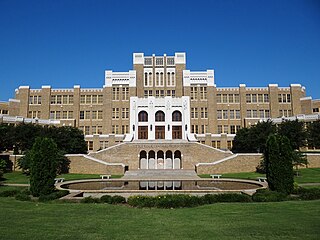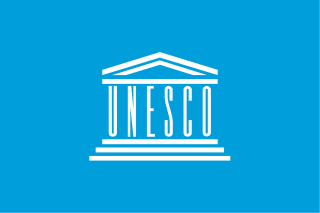This article needs additional citations for verification .(March 2024) |
HiPACT was an association of British universities which was formed in 1991 with an aim of widening participation in higher education. [1]
This article needs additional citations for verification .(March 2024) |
HiPACT was an association of British universities which was formed in 1991 with an aim of widening participation in higher education. [1]

A college is an educational institution or a constituent part of one. A college may be a degree-awarding tertiary educational institution, a part of a collegiate or federal university, an institution offering vocational education, a further education institution, or a secondary school.

Education is the transmission of knowledge, skills, and character traits and manifests in various forms. Formal education occurs within a structured institutional framework, such as public schools. Non-formal education also follows a structured approach but occurs outside the formal schooling system, while informal education entails unstructured learning through daily experiences. Formal and non-formal education are categorized into levels, including early childhood education, primary education, secondary education, and tertiary education. Other classifications focus on teaching methods, such as teacher-centered and student-centered education, and on subjects, such as science education, language education, and physical education. Additionally, the term "education" can denote the mental states and qualities of educated individuals and the academic field studying educational phenomena.

Higher education is tertiary education leading to the award of an academic degree. Higher education, which makes up a component of post-secondary, third-level, or tertiary education, is an optional final stage of formal learning that occurs after completion of secondary education. It represents levels 5, 6, 7, and 8 of the 2011 version of the International Standard Classification of Education structure. Tertiary education at a nondegree level is sometimes referred to as further education or continuing education as distinct from higher education.

A primary school, elementary school, or grade school is a school for primary education of children who are 4 to 10 years of age. Primary schooling follows preschool and precedes secondary schooling.

A school is both the educational institution and building designed to provide learning spaces and learning environments for the teaching of students under the direction of teachers. Most countries have systems of formal education, which is sometimes compulsory. In these systems, students progress through a series of schools that can be built and operated by both government and private organization. The names for these schools vary by country but generally include primary school for young children and secondary school for teenagers who have completed primary education. An institution where higher education is taught is commonly called a university college or university.

Secondary education or post-primary education covers two phases on the International Standard Classification of Education scale. Level 2 or lower secondary education is considered the second and final phase of basic education, and level 3 upper secondary education or senior secondary education is the stage before tertiary education. Every country aims to provide basic education, but the systems and terminology remain unique to them. Secondary education typically takes place after six years of primary education and is followed by higher education, vocational education or employment. In most countries secondary education is compulsory, at least until the age of 16. Children typically enter the lower secondary phase around age 12. Compulsory education sometimes extends to age 20.

Vocational education is education that prepares people for a skilled craft as an artisan, trade as a tradesperson, or work as a technician. Vocational education can also be seen as that type of education given to an individual to prepare that individual to be gainfully employed or self employed with requisite skill. Vocational education is known by a variety of names, depending on the country concerned, including career and technical education, or acronyms such as TVET and TAFE.

In the United States, education is provided in public and private schools and by individuals through homeschooling. State governments set overall educational standards, often mandate standardized tests for K–12 public school systems and supervise, usually through a board of regents, state colleges, and universities. The bulk of the $1.3 trillion in funding comes from state and local governments, with federal funding accounting for about $260 billion in 2021 compared to around $200 billion in past years.

A Juris Doctor, Doctor of Jurisprudence, or Doctor of Law (JD) is a graduate-entry professional degree that primarily prepares individuals to practice law. In the United States, it is the only qualifying law degree, while other jurisdictions, such as Australia, Canada, and Hong Kong, offer both JD degrees and undergraduate qualifying law degrees.

A master's degree is a postgraduate academic degree awarded by universities or colleges upon completion of a course of study demonstrating mastery or a high-order overview of a specific field of study or area of professional practice. A master's degree normally requires previous study at the bachelor's level, either as a separate degree or as part of an integrated course. Within the area studied, master's graduates are expected to possess advanced knowledge of a specialized body of theoretical and applied topics; high order skills in analysis, critical evaluation, or professional application; and the ability to solve complex problems and think rigorously and independently.
A bachelor's degree or baccalaureate is an undergraduate degree awarded by colleges and universities upon completion of a course of study lasting three to six years. The two most common bachelor's degrees are the Bachelor of Arts (BA) and the Bachelor of Science. In some institutions and educational systems, certain bachelor's degrees can only be taken as graduate or postgraduate educations after a first degree has been completed, although more commonly the successful completion of a bachelor's degree is a prerequisite for further courses such as a master's or a doctorate.

A teacher, also called a schoolteacher or formally an educator, is a person who helps students to acquire knowledge, competence, or virtue, via the practice of teaching.

The Human Development Index (HDI) is a statistical composite index of life expectancy, education, and per capita income indicators, which is used to rank countries into four tiers of human development. A country scores a higher level of HDI when the lifespan is higher, the education level is higher, and the gross national income GNI (PPP) per capita is higher. It was developed by Pakistani economist Mahbub ul-Haq and was further used to measure a country's development by the United Nations Development Programme (UNDP)'s Human Development Report Office.

Education in India is primarily managed by the state-run public education system, which falls under the command of the government at three levels: central, state and local. Under various articles of the Indian Constitution and the Right of Children to Free and Compulsory Education Act, 2009, free and compulsory education is provided as a fundamental right to children aged 6 to 14. The approximate ratio of the total number of public schools to private schools in India is 10:3.

The Montessori method of education is a type of educational method that involves children's natural interests and activities rather than formal teaching methods. A Montessori classroom places an emphasis on hands-on learning and developing real-world skills. It emphasizes independence and it views children as naturally eager for knowledge and capable of initiating learning in a sufficiently supportive and well-prepared learning environment. It discourages some conventional measures of achievement, such as grades and tests.

Pedagogy, most commonly understood as the approach to teaching, is the theory and practice of learning, and how this process influences, and is influenced by, the social, political, and psychological development of learners. Pedagogy, taken as an academic discipline, is the study of how knowledge and skills are imparted in an educational context, and it considers the interactions that take place during learning. Both the theory and practice of pedagogy vary greatly as they reflect different social, political, and cultural contexts.

A state school or public school is a primary or secondary school that educates all students without charge. Such schools are funded in whole or in part by taxation.

A secondary school or high school is an institution that provides secondary education and also usually includes the building where this takes place. Some secondary schools provide both lower secondary education and upper secondary education, i.e., both levels 2 and 3 of the ISCED scale, but these can also be provided in separate schools.

The United Nations Educational, Scientific and Cultural Organization (UNESCO) is a specialized agency of the United Nations (UN) with the aim of promoting world peace and security through international cooperation in education, arts, sciences and culture. It has 194 member states and 12 associate members, as well as partners in the non-governmental, intergovernmental and private sector. Headquartered in Paris, France, UNESCO has 53 regional field offices and 199 national commissions.
Sex Education is a British teen sex comedy drama television series created by Laurie Nunn for Netflix. It follows the lives of the teenagers and adults in the fictional town of Moordale as they contend with various personal dilemmas, often related to sexual intimacy. It stars an ensemble cast that includes Asa Butterfield, Gillian Anderson, Ncuti Gatwa, Emma Mackey, Connor Swindells, Kedar Williams-Stirling, Alistair Petrie, Mimi Keene, and Aimee Lou Wood.